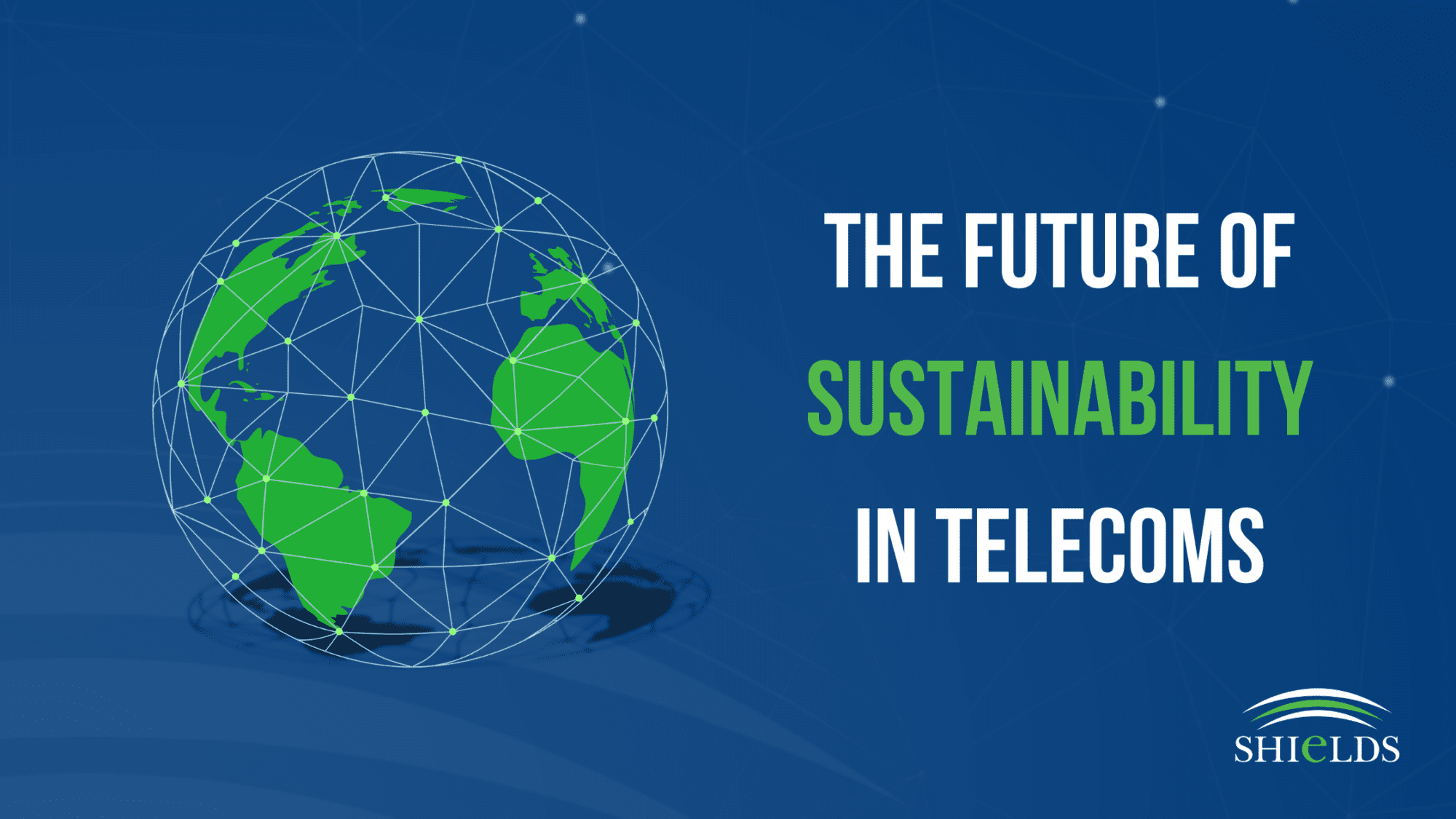Is the telecoms industry really getting more sustainable or is this just a big bubble that’s set to burst? On this page, Shields CEO Daniel Jones looks at the evolution of telecoms networks and summarises where he thinks the industry is headed next. If you’re looking for information about sustainable telecoms, you’re in the right place.
The telecom industry is at the forefront of a global transformation, driven by the urgent need to address climate change and embrace circularity.
As the world transitions from relentless technological advancement to a more sustainable approach, the telecom sector has become a key player in promoting environmental stewardship and resource efficiency.
In recent years, industries from power generation to automotive and aviation have recognised the necessity of balancing growth with sustainability. The shift started gradually, with incremental improvements that seem minor in comparison to the future I think we’re going to see.
We are talking 1-3% sustainable improvements from 2020 – 2025, with the minority trying to change things for the majority. Repetitive messages, a constant uphill battle – but which laid the groundwork for broader changes.
The telecom industry, with its pervasive influence and technological innovation, has so far played a pivotal role in this initial stage of transformation. And now, I think we’re at the phase where those broader changes will set in; we’re on the edge of a revolution.
Shifting attitudes: a compound effect
8 billion people will start to have a compound material effect on the planet’s health from 2025 onwards.
“Most people in the developed world are now making more greener choices in the day-to-day. We all are. And it’s those little changes that are affecting bigger shifts for the good of the planet.” – Daniel Jones, Shields CEO
We’ve all witnessed how financial crashes can cause cost-of-living crises, and as inflation continues to take hold, I think we’ll see this emerging corporate message start to become part of everyday lives even more.
Whereas in the past decade the answer to the common household question “Do we need to buy it?” would have almost certainly been “yes” without further thought, the answer will become “no” in many cases. “We can make the current one last longer”, or “I am happy to borrow my family’s”.
The Evolution of Telecom Networks
One industry that has the power to make a massive contribution to that improvement is the connected world. From consumer products like phones, tablets and laptops, to hyperscale data centres and mobile networks; each should play its roles in the reversal of the planet’s fortunes.
The evolution of telecom networks began with the realisation that new consumer features necessitated corresponding changes in infrastructure. Technological advancements from 2G to 5G and beyond led to frequent hardware upgrades, creating an opportunity for sharing and reusing network assets across different regions and operators.
Shields has been a pioneer in this space, providing the movement of parts safely, reliably, quickly and with lower failure rates than you may get buying new. There’s one of those messages that’s just starting to filter through!
Click here to buy telecoms equipment better, greener and more cost effectively
Why will networks get more sustainable? CSRD Legislation and the “20% rule”
In an ideal world, saving the planet would be something that every member of every team in every telecoms organisation feels in their bones. The reality is that most people are just trying to do their jobs, and sustainability tends to be an afterthought.
The Corporate Sustainability Reporting Directive
Enter the European Corporate Sustainability Reporting Directive which now takes that element of choice away and puts the planet first. The CSRD requires organisations to disclose their annual performance on a range of environmental, social and governance (ESG) aspects including climate change, pollution and circularity. Importantly, the directive requires reporting on Scope 3 emissions as well as Scopes 1 and 2; reflecting the growing recognition of the importance of addressing emissions throughout the entire value chain.
Interestingly, after years spent considering whether to introduce a similar mandate in the USA, this year the SEC decided not to include scope 3 emissions in reporting requirements. I expect there will be more back and forth on this question, but I’m predicting the effect of the CSRD in Europe will give the USA little choice but to adopt a similar mandate before the decade is out.
Click here to find out more about the requirements of the CSRD for telecoms operators.
The 20% rule
What’s more, the Telecom operators aided by legislation from the European Union – and other countries including USA, China and Japan – made it mandatory that 20% of all equipment purchased for use in network be from renewed product.
I expect these changes will soon see every operator write a reuse policy like those found in automotive and aviation. And more importantly, the changes will help network employees feel comfortable with taking reuse as an option over buying new. No longer will a network employee be afraid to source from renewed over new.
“More importantly, the changes will help network employees feel comfortable taking reuse as an option over buying new.
No longer will a network employee be afraid…” – Daniel Jones, Shields CEO
My prediction? Picking the renewed option will result in more credit for the employee, as it led to cost savings, revenue creation, faster lead times and a significant planet benefit.
It’s a future that we’re excited about at Shields, and one that several of the world’s biggest networks are already throwing themselves into.
Book a call to talk about your sustainability strategy in equipment procurement
Who is Daniel Jones? Daniel is our CEO and he’s been at the forefront of Shields’ innovations for the telecoms sector since 2005. His vision? To be the most trusted provider of equipment solutions to telecom network operators. His constant goal is to bring structural change to the way networks source, helping them to buy better and greener, all while maintaining reliable connectivity.


